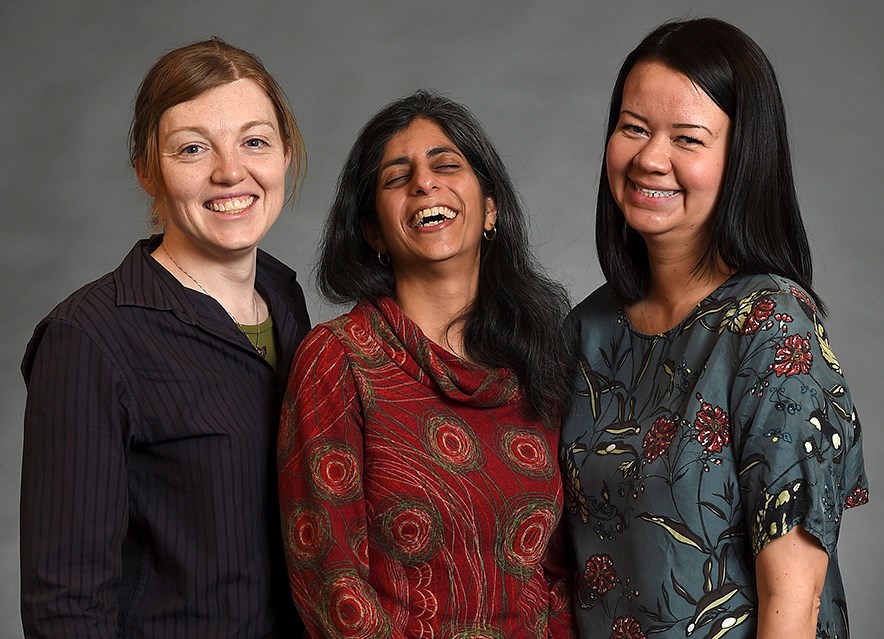International Women’s Day, on March 8, empowered us to share and inspired us to listen to stories from around the world. We took the sparks of those conversations and asked six Vancouver women to go deeper with us, and open up about their identities, their passions and their projects. Here they are, in their own words, on femininity, feminism, gender, race, beauty and how they spend their energy at work.
All interviews have been edited for length.
AMY FOX
Producer, writer and actor; creator of the transgender sitcom The Switch
While it’s the case for most trans women that they have an idea of being who they are for ages and ages, I just knew that I felt very uncomfortable being assigned to and trying to carry out a male role – and definitely more physically uncomfortable than socially uncomfortable. My mom was very progressive, so she was firmly of the opinion that gender should not dictate hobbies, so for me as a child – at least at home – that was not an obstacle. I could play with Lego and also bake and play video games and be interested in science and, like, Here’s a baby doll for the child to be able to practice how to hold an infant. I know other trans people whose first memory is being three years old and getting into an argument about their gender, but that’s not me.
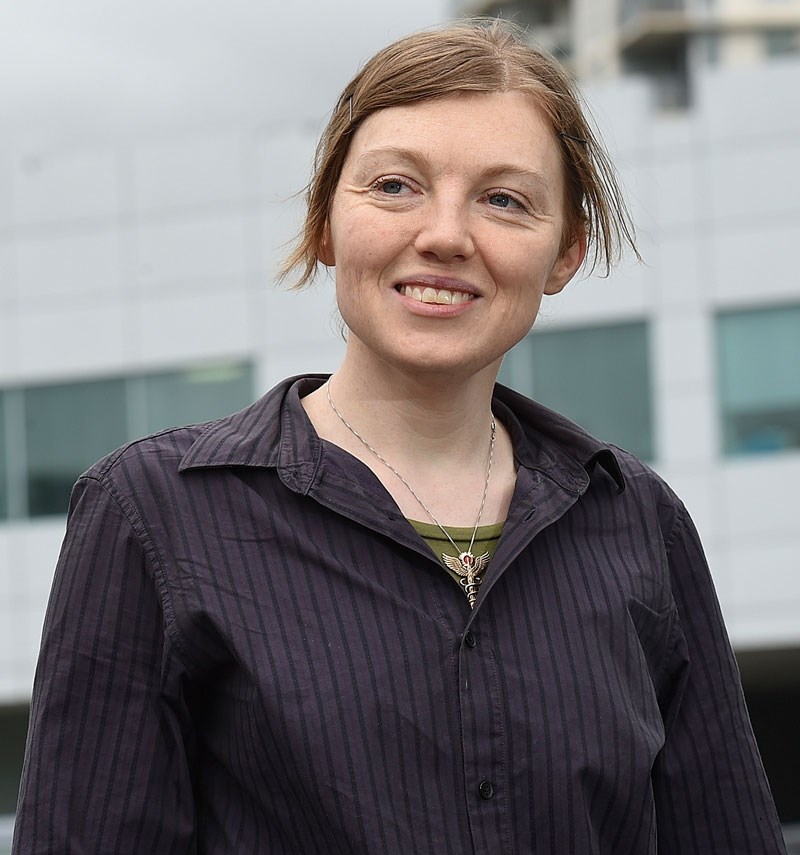
For me, it was more around puberty. Puberty was just a disgusting process. A lot of people can’t fathom why they would ever change, ever transition, and I think part of the problem is they’re thinking of themselves transitioning away from where they feel comfortable. Imagine, instead, waking up tomorrow and starting to go through the wrong puberty. Do you suck it up? Or go to the doctor and say, You need to fix this! And when I say puberty, I mean the very specific physical consequences: growing a beard, having male genitals develop, chest hair, voice dropping. That felt very odd, and it just trashed my mental health at the time. I started getting horrible anxiety, ulcers and so on. I was also getting pretty heavily bullied.
What can be done now, medically, is they can put you on a hormone blocker to suspend puberty until you’re maybe 16 or so, and then you can decide. If you feel like it’s the wrong thing for you, then you can go off the hormone blockers and everything just starts up again.
I’m on 4mg of estradiol and 2.5mg of progesterone per day […], and when I take my medication I do, like, a little daily ritual confirming it – confirming my allegiance to a strange world of bodily autonomy. It’s not a religious ritual, just an acknowledgement.
The question of choice comes up a lot. Sometimes it’s the case of, If you’ve chosen to live the rest of your life a female, then stop fucking complaining about whatever you have to put up with – whether that’s being recognized as trans or being viewed as a woman. But there’s a couple of problems with this. I mean, one, I could say something about how [gender] is as much of a choice as sexual orientation, which is not very much. But the other part of it is, every cis person [someone who identifies with the sex they were born as] also chooses – every day. They don’t go to the doctor and/or change their name, or go buy some hormones on the street. We all are making choices about how we present our gender, what feels comfortable for us.
I don’t have a choice about my gender identity, but I do have a choice about if I’m going to be in the closet or not. And what is the nature of that choice? You see that people can come out to lose their jobs, lose their family, lose their relationship, and be put in incredible physical danger. And they will stay out. And that tells you how bad being in the closet is. It upbraids your soul. It’s the slow psychological destruction of a person, to try to live in the wrong gender.
I’ve seen what happens when people try to go back into the closet and it usually does not end well. That’s an understatement – it usually does terrible things to that person’s mental health. I’ve seen people who have to do it because they realize if they stay out, they’ll die. It depends on where you live and how visible you are as a trans person. There’s a huge disparity in experience, of course, around class and race and ability, but specifically with trans people, whether or not you “pass” as cis. It has a huge impact.
Recently, I started to give myself permission to present in a more feminine fashion. I had presented as butch for the first part of my transition, and part of that was because I wanted to prove to other trans women that it was possible. Sorry, it just felt right for me at the time, but I held onto it for years because I wanted to prove that you could do this. But now, I see more and more younger trans women who can present as androgynous or butch, and they’re just revelling in it. And then I felt like, okay, well, now I can just kind of relax into wherever I want to be.
–As told to Kelsey Klassen
GINGER GOSNELL-MYERS
Aboriginal relations manager for the City of Vancouver; member of the Nisga’a and Kwakwaka’wakw nations
I’m the aboriginal relations manager for the City of Vancouver, and I’m leading our efforts to make Vancouver the world’s first city of reconciliation. I work across all of our departments and city staff to build our reconciliation goals into their work plans, so it’s quite broad and diverse – the work that I do with the engineering department is much different than the work that I do with the social policy department, but all are building reconciliation efforts into the work that they do. I’m the glue that holds it all together. (Laughs)
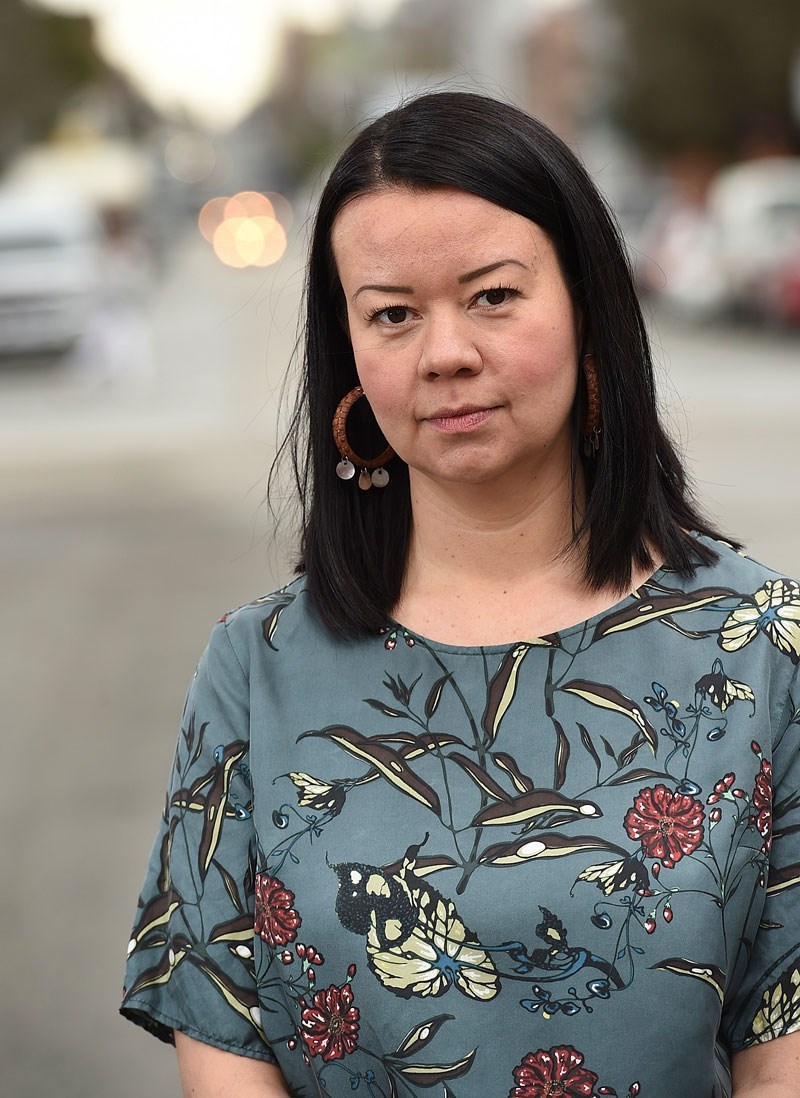
In our indigenous communities, I’ve always noticed women were not just the caretakers but the voices of really complex social issues: family dynamics, the betterment of the community. And these were issues I just didn’t see too many of our male counterparts picking up and carrying, you know? The burdens and the work that indigenous women carry is much different than the work and the burdens that indigenous men choose to focus on.
Women are really the cornerstones of our community – ensuring that the needs were taken care of, that our leaders were supported, that important wisdom was shared and implemented as needed. Our roles were really as thinkers and to ensure that things were done in a heartfelt way. And it’s really hard today to talk about how things were pre-settlement, because we don’t know too much, but I just get this sense, from being an indigenous woman and seeing and hearing from my aunties and my grandmas, that the strength they carry and the composition that they have… there’s just an obvious difference between the women [and the men] and the role they play in our community. I think that has to extend back to the roots of our community and the role they would have played.
I hate to make this broad characterization, but it seems like women are on the ground doing the hard work. It’s one thing to be a spokesperson and it’s another to actually be behind the scenes, rolling up your sleeves, making sure that things are happening and that people are being taken care of. I think about some of the women that I look up to, like Cindy Blackstock – she runs the First Nations Child and Family Caring Society [of Canada], and as long as I’ve known her, she’s been advocating for First Nations children in the care system, and First Nations children who require health care, to receive that level of care from the Canadian government. I remember her conducting new research and creating messaging around the care of our children – our most vulnerable children – with complete absence of leadership for a long, long time. So that’s what I mean by the hard work. It takes a lot of effort to get community initiatives and programming and even advocacy around issues off the ground, and you’ll often see women behind these large-scale community matters, community issues.
Traditionally, indigenous communities had roles for genders, and for ages, and we’ve lost sight of those roles because of colonization. I think maybe the intersection with some of today’s discussions around feminism and advocacy for indigenous women is about reclaiming those roles. Not even reclaiming roles so that they have community recognition, but reclaiming the roles at the individual level. There’s so much trauma that our communities are dealing with because of colonization, because of the impacts of residential schools, that a lot of the work that we need to do in the community starts with the individual. And the work that women need to do, personally, often takes a backseat because of their need to care for their children, to care for their parents and our elders, and even our community, ensuring that the cultural needs for feasting or ceremonial purposes are taken care of.
So, there are a lot of roles that women need to play, but first we need to reclaim them and better understand them so that it’s intuitive and well understood in a modern context.
–As told to Kelsey Klassen
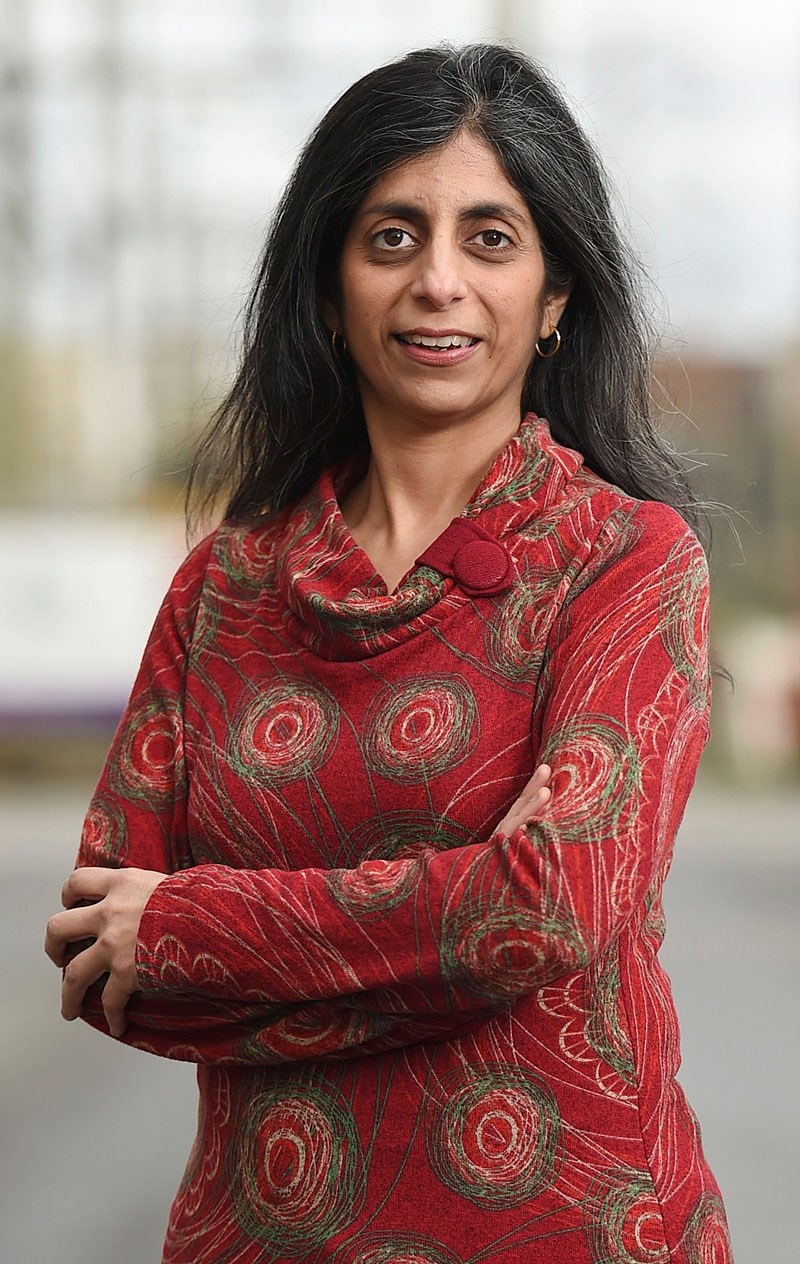
MEHAROONA GHANI
Writer, poet, social-justice activist and diversity workshop leader living with multiple sclerosis; contributor to upcoming anthology The Muslimah Who Fell to Earth
What is womanhood or feminism? It's about knowing who I am, my flaws and strengths from an ego-less place. My power came from my mom and dad, and right now it is definitely coming from my mom, my sister too, and also from both women and men in my life. I am also very, very privileged that I had the kind of parents I do, and that in their migration story they chose Canada. Because of this mix of chances, I am privileged to have had choices. Not every person has choice. I consider myself extremely blessed, even with an incurable disease. After being told I had MS, my life became even more about purpose and about living it to its fullest.
Now, I just talk to strangers, I just start talking to people! Maybe this is an age thing, and maybe me coming into my womanhood… I am confident. I don’t give a shit about grey hair. In, fact I love my grey hair!
The first woman of colour I heard speak was Glenda Simms [a past-president of the Canadian Advisory Council on the Status of Women]. When I heard her, I was like, Wow, I want to be like her. I decided to go back to university… I got interested in women’s studies. In the late ’80s, I didn’t see anything that spoke to my identity as a person of colour, and so as I went through. I was always very vocal about racism and How does racism play out in the feminist movement? It never represented me. Where were my voices? I credit my university days as a time when I learned to be an advocate.
Intersectionality, I’d never heard of it at that time. I started a student organization called Society for Indian Classical Arts because I was really into Indian dance, and I felt the traditional dances were just as good as ballet, just as serious as ballet. I started up a women-of-colour collective; there was not one before. That was all part of my activism... Where are my foremothers, is what I would say.
I was always mindful of the clothing that I wore… The hijab didn’t change me. I was still the same person, but the question I was exploring was, Does this really connect me to God? And the answer I came to was no. I am not against it. What I am against is if wearing it is forced. I don’t like to use the word God; I now say the divine. In Arabic, the word Allah is gender-neutral and is neither male nor female.
It donned on me that I am the most happy right now because I’m doing everything I love and I am most free in my identity. I found who I am outside of working in government. I came back to who I am, which is a writer. The MS is unfortunate, but it gave me another layer of understanding and freedom that maybe I wouldn’t have had.
–As told to Megan Stewart
JACKIE KAI ELLIS
Pastry chef and owner of Beaucoup Bakery and Café; author of the upcoming memoir The Measure of My Powers
I think the people who most affected my idea of what being a woman was, early on, were my grandmother and my mom. My family was very much a woman-in-charge sort of family, and there was nothing they couldn’t do. They brought home the majority of the income, as well as cooked and cleaned, took care of the children.
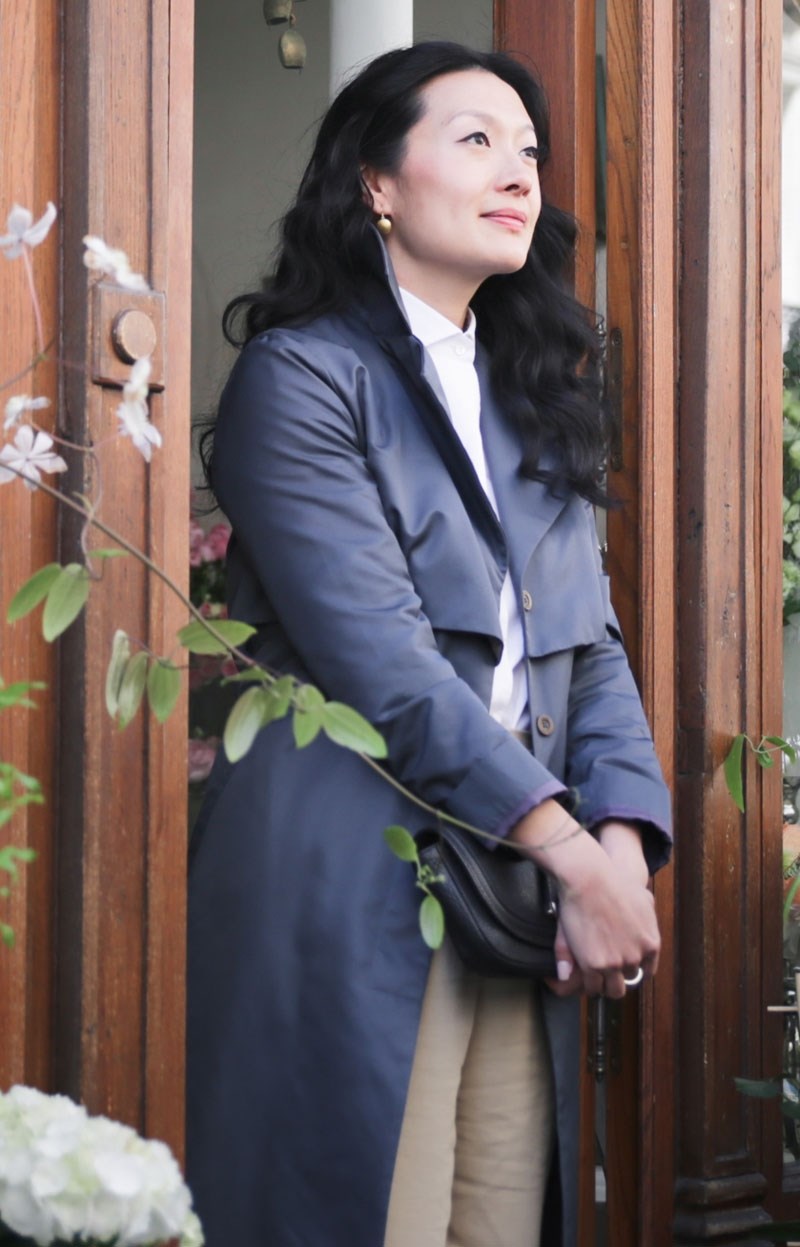
I didn’t even know that sexism was a thing until my mid- to late 20s, because the thought hadn’t even crossed my mind that women weren’t equal – if not, in some ways, superior. And because I didn’t understand that there might have been a prejudice, I never looked for it. Whenever someone might have been prejudiced, I always assumed, well, maybe it’s my work, or something much more objective.
So, I didn’t realize until I was in an art-director position at an ad-design firm. I was quite high up, and I was hiring copywriters for a project I was working on, and the copywriter was really kind to me in a group setting, but when I would give him creative direction on the phone, he was quite rude. This was almost a decade ago now, so I don’t remember exactly what he said, but he would kind of be like, Look, honey. I’ve been in this business for a long time. Why don’t you just take my word for it and just print it as is? And I was like, I’m the one who’s in contact with the client, and they say it’s not good enough, and I agree. So, what’s the problem? And then he asked to speak with a man. My first thoughts were, did I offend him? Did I do something wrong? I talked to an older woman about him, because I was so confused, and then she goes, Well, he’s sexist. It’s because you’re a woman. And I wondered, is that even true?
To this day, I don’t know for sure, but he was sort of an old curmudgeon-y kind of guy, and that was the first time that thought had crossed my mind. I think when I was younger, I was so insecure about everything that being a woman was the last of my insecurities. I had so many other things I was insecure about, that when you pile one more thing on top of it, it doesn’t really make a difference. (Laughs)
Growing up, I was very afraid of being unintelligent or being stupid, of not amounting to anything – you name it. Not being pretty enough. I had very mixed messages, because back when I was growing up, Asian people weren’t beautiful, right? In my Asian family, I was considered quite pretty for an Asian person, but when I’d go out into the world, Asian people just weren’t pretty at all. And so I would have, strangely enough, insecurities about not being pretty enough, but being too pretty to the point where people in my family would say, It’s a good thing that you’re pretty, because you’re so stupid you’re never going to make anything of yourself, and you’re going to have to marry someone that’s rich.
I was so afraid that that would be true, and at the same time I felt horribly ugly in every other instance, that it created this really strange perception of myself in the world. But now I can see, at the age of 38, that it actually helped me a lot. I never thought of myself as an intellectual, and that developed a lot of my creativity in different ways, and it helped me to understand that intelligence is as varied as people are. So I’m quite grateful that all this stuff happened. It was hard back then, but now I look at myself and go, Okay, the weirder I am and the more unique I am, means I’m doing a good job of being who I am.
–As told to Kelsey Klassen
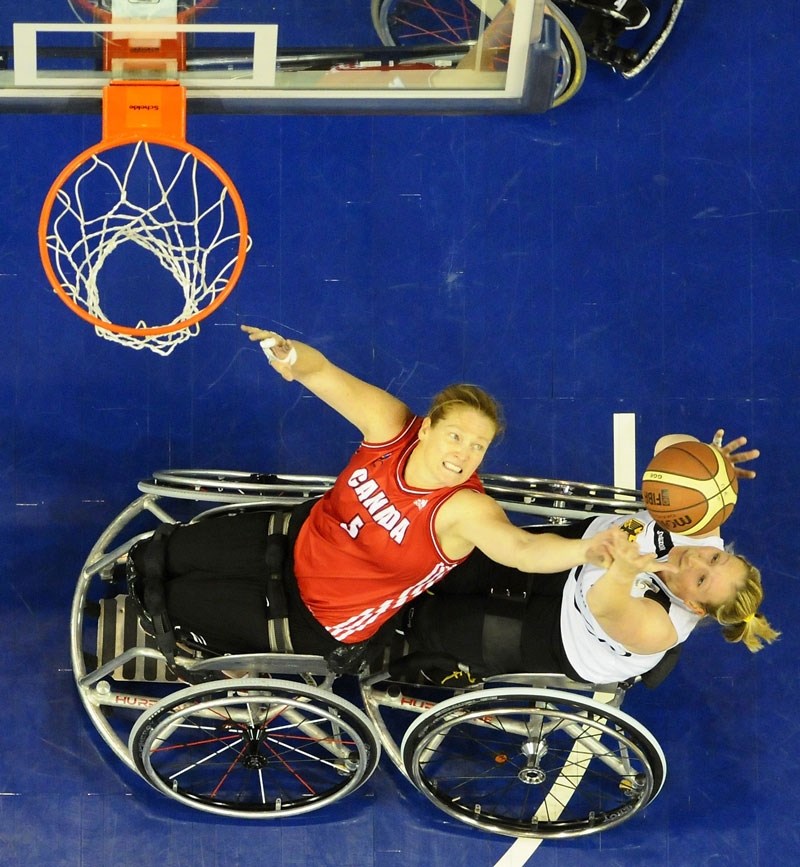
JANET McLACHLAN
Athlete in the Rollstuhlbasketball-Bundesliga (a co-ed, semi-professional wheelchair basketball league in Germany), recently retired from Canada’s national team
When people ask me who I am, my first thing is that I’m an athlete. It’s what I’ve been doing for as long as I can remember. It’s been my job and my life. For the last seven years, it’s been how I earned my living.
We just moved up from the second division last year, so it’s quite impressive that we made the playoffs. It’s exciting for our fans and our club – our season isn’t over yet! The best crowds in the league are a couple thousand for playoff games. Not all, but a lot, of the players get paid.
I played university basketball at UVic – I played stand-up ball there for five years – then played a year in France for a club and was back in Victoria and I started playing rugby. It was then that I sustained a knee injury. My knee is sufficiently wrecked that I can’t play able-bodied sport, and any running and jumping and pivoting is really difficult. I don’t use a chair except on the basketball court.
With wheelchair basketball and… my German is getting in the way, and I want to say fussganger basketball for stand-up basketball! It is very much a similar game, but there is a much bigger team aspect because the chair and the rules create the opportunity to stop players going where they want to go on the court, so you can almost essentially block like you would in football. The necessity for team play is much more a part of wheelchair basketball, and I find that exciting.
Retirement from Team Canada was an incredibly difficult decision to make, and I cried when I said the words. You put on a Canada jersey and – even talking about it now, I’m getting a little choked up. You put on that jersey and it means so much, walking into the stadium at a Paralympic Games… There aren’t really words. That, I will miss incredibly. I won’t get to do that as an athlete again.
I was always seen as a tomboy – I really didn’t do anything to dissuade anyone from thinking otherwise. I was interested in being outside and I played with the boys all the time — it was more fun. I don’t know that it affected my sense of being a girl. My mom was very sporty – she’s a tennis player and she was always very active. My grandmothers on both sides were both very accomplished women [and] both my aunts were very successful. I had those role models and I never really questioned it. I never really thought there was any other way to be. My dad, he always encouraged me. He always expected me to do what my brother did, helping around the house – whether it was moving or building things – and that was the key to where I am now, believing in that and knowing that when I went out to the baseball diamond or the soccer field or the basketball court, just because I was a girl didn’t mean I couldn’t play.
I’ll be honest: We always have self-doubt and we always question our ability to do something, but if something scares me, I want to confront that fear and not let it stop me from doing something. I think my success in sport has given me the confidence to try. I’m for girls and women finding aspects in life that give them confidence and using that for times when they doubt themselves. It’s up to role models in their lives to give them that confidence.
I do have strong feelings about the way women are treated, but I also feel it’s very important to deal with that through our actions. It’s all well and good to say This is unfair and This needs to be better, but I think it’s very important to follow that with action. You have to prove that you deserve to be treated as an equal. Maybe that’s something I’ve had from sport, because if I wanted to be picked for a sports team and if I wanted to play with the boys, I had to prove I was good enough. Picked last for the kickball team because I was girl and then I out-kick everyone – well, you get picked higher the next time. A boy has to go out and prove himself, too: If they strike out every time the ball comes their way, they don’t get picked anymore. Yes, not everything in life is a kickball game, but I see what’s happening with the U.S. women’s hockey team and, at a certain point, they’ve obviously proven they’re good enough to deserve financial help. They will strike, basically, in order to try to get some sort of equality. I feel lucky, in some regard in Canada, that we have the funding we do. There are still big discrepancies in women’s sport in Canada, and I think it’s an ongoing fight. But hopefully, one day, things will be equal and it won’t matter if you’re a boy or a girl or where you come from or what religion you are.
–As told to Megan Stewart
HARSHA WALIA
Social-justice activist and political organizer with the Downtown Eastside Women’s Centre and No One Is Illegal; author of Undoing Border Imperialism
How do I identify? Hardest question ever! It depends on the day – primarily as a South Asian, Punjabi immigrant here on Turtle Island. The identity of being a South Asian immigrant is also a shift in identity, because it becomes such a homogenizing pan-identity in the context of being far away, so what I grew up with was a much more specific identity. I came from a mixed-class, mixed-caste, mixed-ethnic background, so those identities were much more specific to me prior to migration. Also, there is the understanding of myself as a settler here on Turtle Island.
Right now, with all the conversations around both Canada 150 and reconciliation, they very superficially make a gesture towards indigenous presence without, in any significant or substantial way, altering power structures. Turtle Island is a phrase that many indigenous communities use to reference North America, and for me as an immigrant, I recognize Canada continues to be a colonial entity that is establishing its unjust jurisdiction on indigenous people’s land.
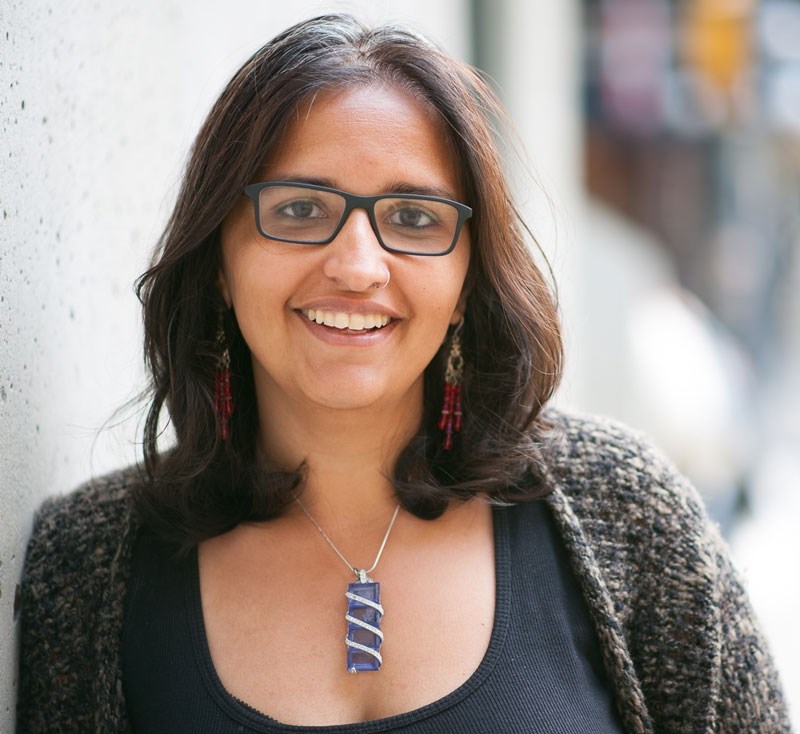
Also, there is this myth of Canada being multicultural and welcoming, yet the reality is there are many people who are in detention centres, which are like prisons. I was briefly detained.
Gender binary is a construct, and I am weary of gender essentialism, and that for people who are socialized into being women, people who are femmes, people who are trans identified and two spirit, I don’t think there is any social capital at a systemic level. There is the really superficial discourse of, Oh, you can get a free drink at a bar, which is hardly anything when it come to the systemic nature of how patriarchy works. When we look at all the kinds of expectations that are put on mothers to be super-human, to work in the wage economy and labour in the completely unpaid domestic sphere, there is absolutely no social capital or power to experience in patriarchy. And also, a free drink at a bar doesn’t protect you from rape, so the kinds of sexual violences that are placed on women and femmes and trans people are severe and incomparable to the imagined benefits and privileges.
It is a factual, objective truth to say there are a multitude of feminisms and that no one can claim a dominant feminism, that there are various strands and some that are more problematic than others, white feminism being problematic because, of course, if you’re centered in whiteness, you’re doing it at the expense of women of colour, but in the same way that cis-gendered feminism comes at the expense of trans feminisms. For me, I actually think that while it is often meant in a derogatory way, I think it is objectively true, because if I have to claim women-of-colour feminisms, as the feminisms that I participate in, then I think we should be clear that all feminisms claim a certain kind of specificity, rather than white feminism being the dominant feminism, which is the way privilege works. By not naming it, it continues to exist.
Most of my role models are people I have met. I am cautious about placing on a pedestal people whose full story we do not know. Most of my role models are people I am in community with. For me, my idols are those whose full humanity I can experience and understand. It’s also seeing how people embody their principles and their struggles. It’s so many women in this neighbourhood! Beatrice Starr, who passed away a few years ago, was the matriarch in this neighbourhood. My role models are women like that.
I get a lot of strength from being in social movements that are based in relationships, from hearing other people’s stories of struggle. For me, as someone who was under immigration limbo for a decade, that is something that creates fear in people. It’s meant to create fear and is meant to keep people silent and disempowered. So, for me, the only thing that got me through it personally and allowed me to keep fighting in a somewhat public way and to not be afraid was making connections with other people in similar situations and finding that collective power, personal power, is inseparable from collective fire. You breathe fire when someone else fuels you. It is so necessary for me to be connected to other people. Coming back to this idea that we live in this world that is so neo-liberal, so isolationist – so, for me, it is so necessary to challenge that idea of the individual in my own life, because capitalism wants me to believe I can somehow affect change as an individual, that I can set my whole purpose as an individual, and I just don’t think that is possible.
It’s imperfect, but even in organizing, it is so important to be part of groups and collectives, especially because there is increasingly a narrative that you can be an individual social-change-maker, which you can. I can make individual choices around ethical consumption, for example, but my bigger priority is how to engage in this work with other people. So, to be in dialogue with other people, to be in community-based efforts with other people – that, for me, is one of the ways I try to do that. I think about it all the time, but one time I thought about it a lot was when I wrote a book. It took me three weeks to write the book, but it took me six months to think through how I was going to do it. There are over 24 contributors to the book, and that was a very intentional decision. If I am going to be writing about social change and if I am going to be organizing, I want to be doing it with other people’s voices and contributions as being lifted up.
Beauty is something that, of course, I thought about a lot in my teenage years and in my early 20s. Now I literally don’t have that as part of my self-tape in my head – I haven’t had it for a few years, but I think I’ve been aware of it since I had a kid. The dominant tape in my life now is if I’m being a decent mom. I know “beautiful” means many things, and you can also be a beautiful mother, but, for me, it’s just not something that is part of my internal message anymore.
I come from a matrilineal history loaded with trauma and displacement and violence and incest and rape… So, at the minimum, being a good mother is physical safety, it’s stability. My kid is only two, so I know it will only get more challenging. After that, it’s having my kid’s emotional needs met. My experience with my own parents is complicated. I left home young. They also were migrant workers, so my attachment to parenting is nebulous, and so it’s also about trying to learn how to mother.
–As told to Megan Stewart
